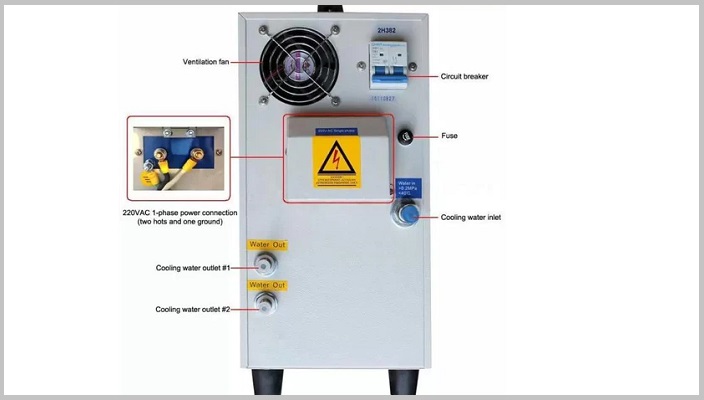A compact induction heater is a versatile and efficient device that utilizes induction heating technology in a portable and space-saving design. This innovative technology has found applications in various fields, providing quick and precise heating for a range of purposes.
One prominent application of compact induction heaters is in the realm of cooking appliances. Portable induction cooktops have gained popularity for their convenience, energy efficiency, and rapid heating capabilities. These cookers typically consist of a compact induction coil beneath a glass or ceramic surface. When a compatible magnetic cookware is placed on the surface, the induction coil generates a magnetic field, inducing eddy currents within the cookware, and leading to rapid and controlled heating. This allows for precise temperature adjustments and faster cooking times compared to traditional stovetops.
In the field of metalworking, compact induction heaters play a crucial role in processes such as soldering and brazing. The ability to achieve high temperatures quickly and precisely makes induction heating ideal for joining metals. Compact induction heaters designed for metalworking applications are equipped with features like adjustable power settings and temperature control, enabling artisans and professionals to perform intricate tasks with precision.
Laboratories and scientific institutions also make use of compact induction heaters for specific heating requirements. These devices provide a controlled and localized heat source, making them valuable tools for various experiments and processes. Their compact size allows for easy integration into laboratory setups, contributing to the efficiency and accuracy of scientific work.
For DIY enthusiasts and hobbyists, compact induction heaters are valuable tools for a variety of projects. Whether it's heat-treating small metal components, experimenting with induction-based heating applications, or engaging in creative endeavors, these devices offer a compact and accessible solution for those looking to harness the power of induction heating in their workshops.
Educational settings often incorporate compact induction heaters to demonstrate principles of electromagnetism and induction heating. Students can observe firsthand how the application of an electric current to a coil generates a magnetic field, leading to the heating of nearby conductive materials. This hands-on experience enhances understanding and appreciation of fundamental scientific concepts.
While compact induction heaters offer numerous benefits, it's essential to adhere to safety guidelines and manufacturer instructions. Induction heaters can reach high temperatures rapidly, necessitating caution to prevent burns or damage to surrounding materials. Users should ensure proper ventilation and be aware of the specific safety features incorporated into their compact induction heater.
What is required for Induction Heating ?
The compact induction heater represents a technological advancement that brings the benefits of rapid and precise heating to various applications. From cooking to metalworking, laboratories to DIY projects, these devices offer a convenient and efficient solution for those seeking a portable and space-saving induction heating solution. As technology continues to advance, we can anticipate further innovations in compact induction heater designs, expanding their versatility and utility across different domains.
Specifications
Specifications for a compact induction heater can vary depending on the specific model and its intended applications. However, here are some common specifications and features that you might find in compact induction heaters:
Power Rating:
Induction heaters typically have a power rating measured in watts. The power rating determines how quickly the device can generate heat. Common power ratings for compact induction heaters range from a few hundred watts to a few thousand watts.
Frequency:
The frequency at which the induction heater operates is an important specification. Common frequencies for induction heaters are in the range of 20 kHz to 100 kHz. Higher frequencies often result in more precise and localized heating.
Temperature Control:
Many compact induction heaters come with temperature control features. This allows users to set and maintain specific temperatures for different applications, such as cooking or metalworking.
Heating Element Material:
The material used for the heating element or coil can impact the efficiency and durability of the induction heater. Common materials include copper or aluminum.
Size and Form Factor:
Compact induction heaters are designed to be portable and space-saving. The physical dimensions and form factor are crucial specifications, making them suitable for various applications, including tabletop cooking, DIY projects, and laboratory setups.
Control Interface:
The user interface and control options can vary. Some induction heaters have simple knob controls, while others may feature digital displays with buttons for precise temperature adjustments.
Safety Features:
Safety features are essential to prevent accidents. Look for features such as automatic shut-off when not in use, overheat protection, and indicator lights for user awareness.
Cooling Mechanism:
Induction heaters generate heat, and an effective cooling mechanism is crucial to prevent overheating. This could involve internal fans or other cooling systems.
Compatibility with Cookware:
For induction cooktops, it's important to ensure compatibility with different types of cookware. Many induction heaters work best with ferrous (magnetic) materials.
Applications:
Consider the intended applications. Some compact induction heaters are designed specifically for cooking, while others may cater to metalworking, laboratory experiments, or DIY projects.
Voltage and Power Source:
Check the voltage requirements and power source compatibility to ensure that the induction heater can be used in your specific location.
Certifications:
Look for certifications from relevant safety and quality standards organizations. This ensures that the compact induction heater meets certain industry standards.


